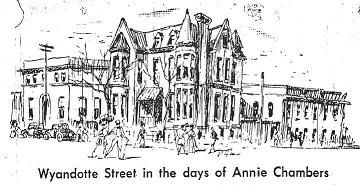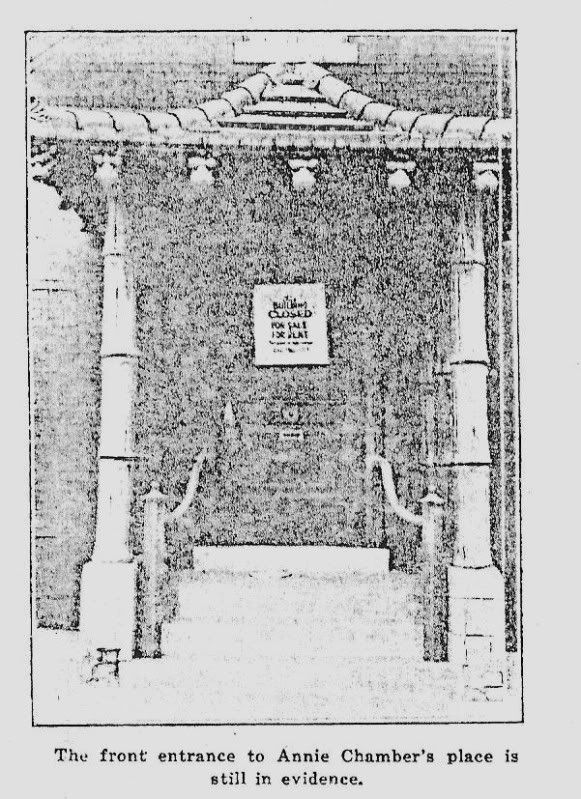Re: Postcards From the Edge of Time
Posted: Thu May 20, 2010 9:36 am
The north loop was never the "crosstown freeway." The crosstown freeway was the sunken I-670 on the south loop. The north loop was the 6th Street freeway.
Just like guns kill people? The auto didn't do what you said, it was people making decisions. Or do autos have brains now?trailerkid wrote: Leave it to the automobile to destroy America-- block by block.
It's a real shame seeing pictures like this which show what the city looked like before the biggest mistake in urban American history (the urban interstate). Not only did the urban interstate system change forever, and for the worse, the landscape of American cities, it also destroyed wide swaths of urbanity on both sides of our downtown. I have a difficult time understanding the thought process that allowed the state to take that much land from private citizens and destroy it for a highway network. The decision to run the interstate system through the city was a disaster for my parent's nascent family. My father's successful restaurant was destroyed for I-70 and the replacement was a total failure....location was indeed everything. My first few years of life were spent in near poverty as a result.FangKC wrote: Downtown KC in 1940 from the River Market looking south before the North Loop freeway was constructed. In this photo, one can see several old buildings that are gone now: Midland Exchange Hotel building; the Produce Exchange Bank at Missouri and Walnut; the Nelson Building at Missouri and Main; WalSix Building; Old YMCA building; Schuyler and Densmore hotels, Studio-Pepper Building; Victoria and Frederick Hotels at 9th between McGee and Oak; and Manhattan Building on Main near 8th.
Use scroll to see entire photo.
Source: Kansas City Public Library Special Collections
http://kchistory.org/cdm4/item_viewer.p ... X=1&REC=11
Is it far too precious to destroy or is it far too expensive to purchase? And especially when one considers the ratio of land acquistition to cost of the project. And even the amount of funds a government can throw at a project. And if one considers Kansas City most of the buildings destroyed for the dt highway system were not "that old" when the decisions were made where to locate the highways. In other words when we look back now 50 years after those decisions those buildings maybe were not 50 years old, not that much history in terms of age at that time. And also consider, the high rise buildings in the picture "replaced" buildings of a shorter stature. And many of the "short" buildings in the picture have since been replaced by other, usually taller, buildings. For the most part this country has had "make it bigger and better" mentality since the late 1800's and early 1900's. Building highways was no different than replacing one or more three story buildings with a single 25 story building to those making the decisions.Highlander wrote: Inter-city movement is emphasized and there are often ring highways surrounding the cities but they regarded urban real estate as far too precious to destroy for a transportation system.
I believe the stripping took place because the terra cotta ornament was starting to become unstable and pieces were falling to the street. Probably not a problem if they had a tenant and hence a way to pay to renovate the exterior but that was in an era when companies were leaving downtown right and left and several attempts to rehabilitate the building since have met with limited success. Great building, sad history.moderne wrote: The beautiful gothic terra cotta ornament on the SW Bell(Oak Tower) before it was stripped off in 1975. Once one of the most elegant high rises in the city has looked like a shaved collie ever since.
I understand where you're coming from, but I can also see a couple of different perspectives.Highlander wrote: It's a real shame seeing pictures like this which show what the city looked like before the biggest mistake in urban American history (the urban interstate). Not only did the urban interstate system change forever, and for the worse, the landscape of American cities, it also destroyed wide swaths of urbanity on both sides of our downtown. I have a difficult time understanding the thought process that allowed the state to take that much land from private citizens and destroy it for a highway network. The decision to run the interstate system through the city was a disaster for my parent's nascent family. My father's successful restaurant was destroyed for I-70 and the replacement was a total failure....location was indeed everything. My first few years of life were spent in near poverty as a result.
I love the European highway system. Inter-city movement is emphasized and there are often ring highways surrounding the cities but they regarded urban real estate as far too precious to destroy for a transportation system. Their cities are still wonderful places to experience.
Necessity perhaps - but it clearly wasn't necessary to build it in this destructive manner; the rest of the world seems to have gotten on just fine without plowing sixteen lanes of highway through the middle of their urban cores. That was the exact opposite of "necessity". And it certainly wasn't a "necessity" to systematically dimantle our rail network in favor of producing as many card-carrying teamsters as we possibly could. What was done is done, but that doesn't mean we should all be highway apoligists, pat ourselves on the back over it or continue making the same terrible mistakes.Joe Smith wrote: One. The interstate highway system was a real necessity back in the 50's
By the rest of the world, I'm sure you mean Brazil, China and Russia. Those 3 countries have been around for quite awhile longer than the U.S. has and have done some really nice community razing themselves. Just China alone has wiped out many a city and village building the Three Gorges Dam. Heck, there's even a town sitting at the bottom of Lake Jacomo right now. Who knows how much was lost at the Lake of the Ozarks.LenexatoKCMO wrote: Necessity perhaps - but it clearly wasn't necessary to build it in this destructive manner; the rest of the world seems to have gotten on just fine without plowing sixteen lanes of highway through the middle of their urban cores. That was the exact opposite of "necessity". And it certainly wasn't a "necessity" to systematically dimantle our rail network in favor of producing as many card-carrying teamsters as we possibly could. What was done is done, but that doesn't mean we should all be highway apoligists, pat ourselves on the back over it or continue making the same terrible mistakes.


Don't get me wrong. I love the interstate system, I just question the logic of building the interstate system through urban areas. Any visitor to Germany in 1945 instantly saw the potential of the autobahn in the US where land was available and distances were significantly more than Europe. The autobahn was and is a great way to get around and I am happy Eisenhauer copied it in the US, it was needed (particularly if you can remember long drives on non interstate roadways before the network was complete). Nonetheless, the US went further than pre-war Germany by not only putting the system through urban areas but destroying large swaths of urbanity to accommodate the system. That's unique t the US. Bombed out Germany could have done the same in the post war era but in addition to a paucity of land, I just think they had to see the consequences that such an urban system would have on being able to build and maintain appreciable public transport networks in their cities.Joe Smith wrote: I understand where you're coming from, but I can also see a couple of different perspectives.
One. The interstate highway system was a real necessity back in the 50's and just getting the whole thing started, let alone finished, was a huge accomplishment in the history of our country. In transportation circles, Eisenhower is still regarded as some sort of god for heading the effort. The planners could of probably routed the highways around all the cities, but back then the highways were seen as a great equalizer for those who barely owned a car, let alone those who could of afforded more expensive travel options.